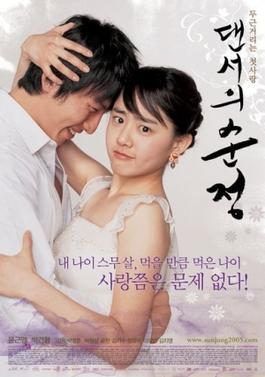Innocent Steps (2005)
Na Young-sae, an acclaimed professional dancer, loses his dance partner to a richer competitor who sabotages the competition and injures Young-sae's knee. Young-sae's manager ships over a Chinese girl as his new partner, but it turns out she's barely 19 and has zero dance experience. Young-sae then has 3 months to teach Jang Chae-ryn how to dance, and she falls in love with him, all while trying to dupe the government into making their green card marriage look real. At least half a dozen F-bombs, and some violence, but no sex or nudity. Some of the dancing was quite good, but it was very somber throughout, and the ending didn't quite make sense, even though it's “happy.”
*Will not watch again. The characters just
aren't lovable enough, and nobody even kisses.*


